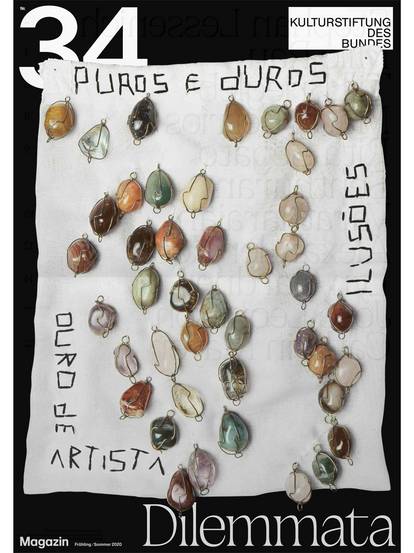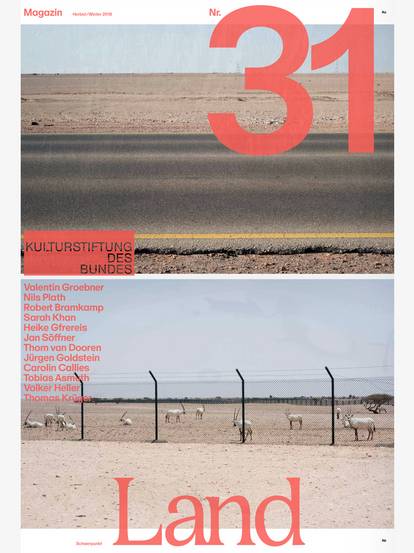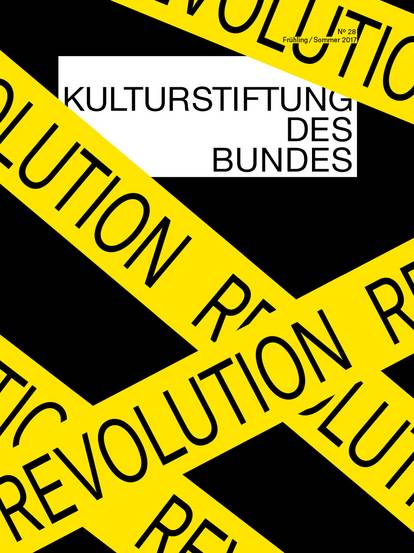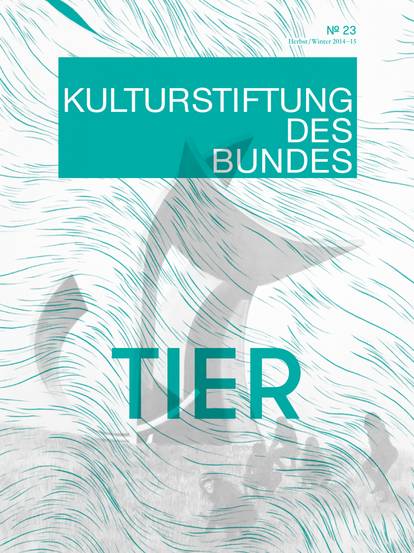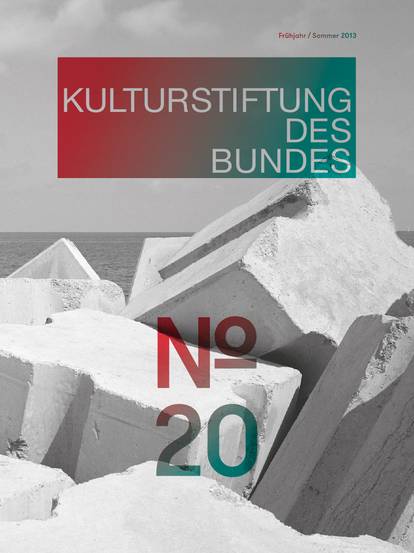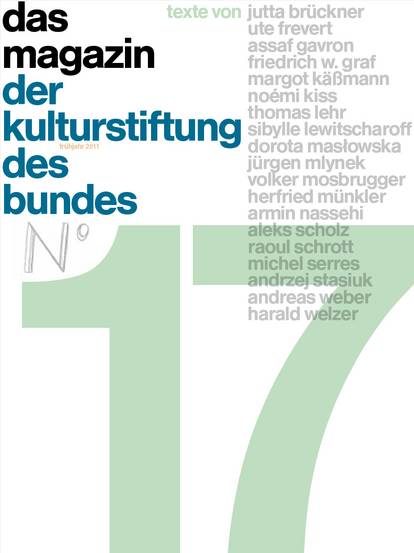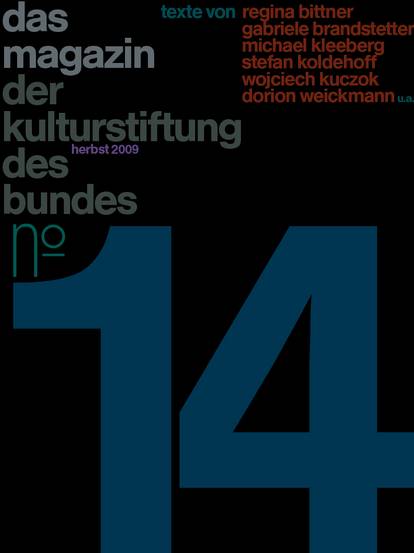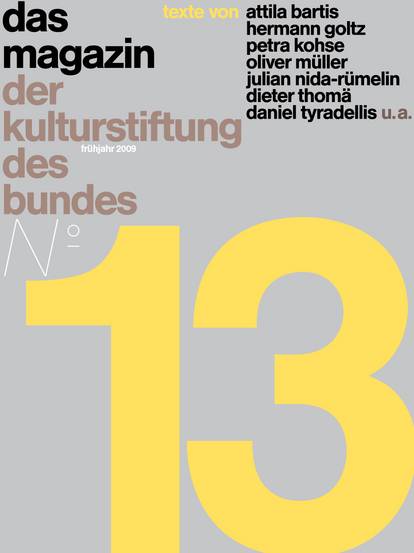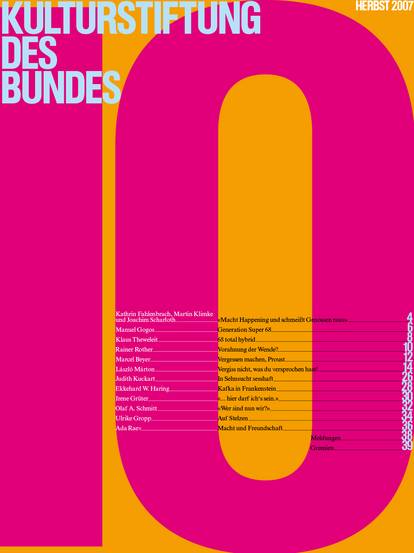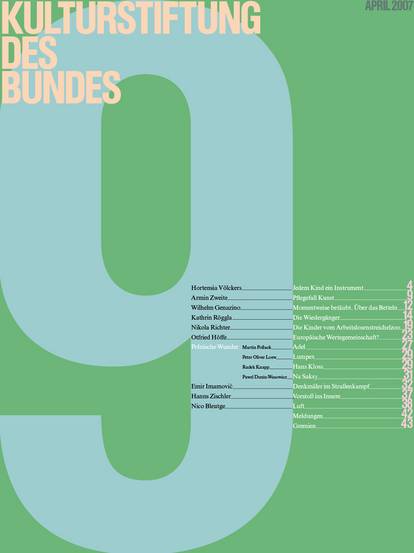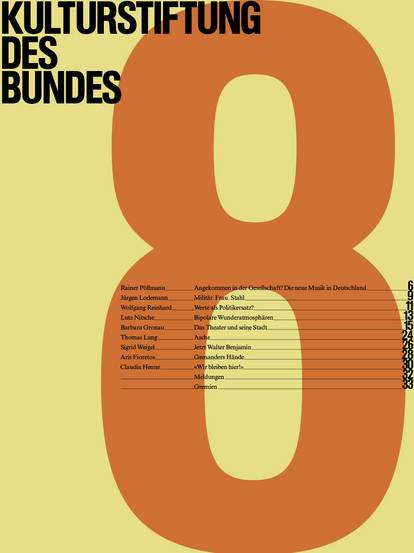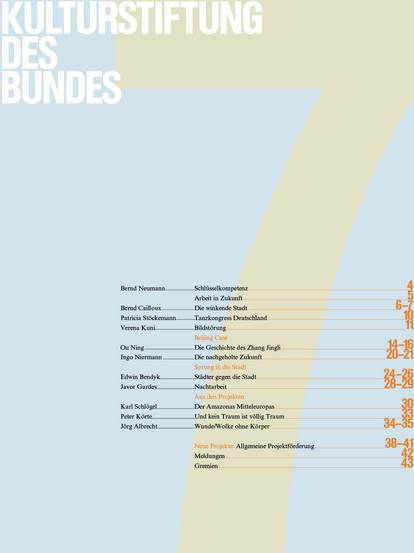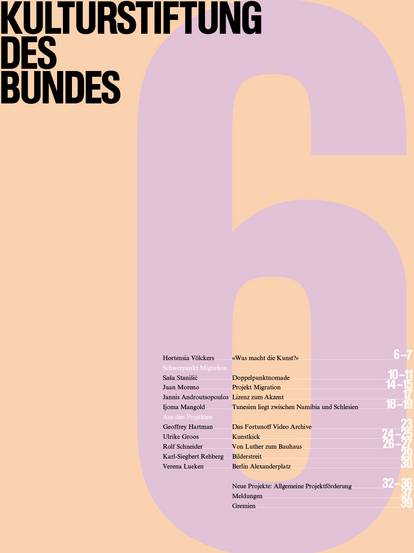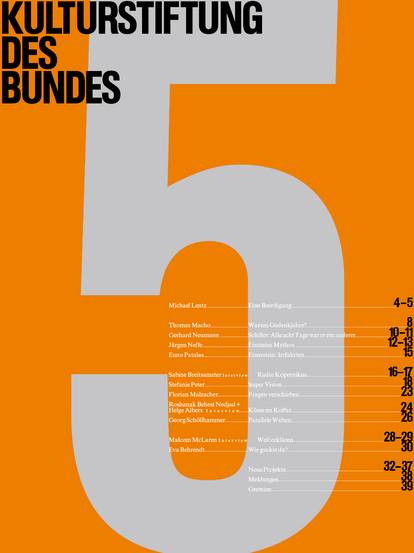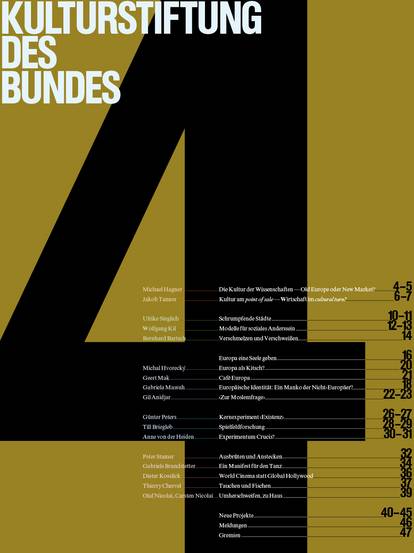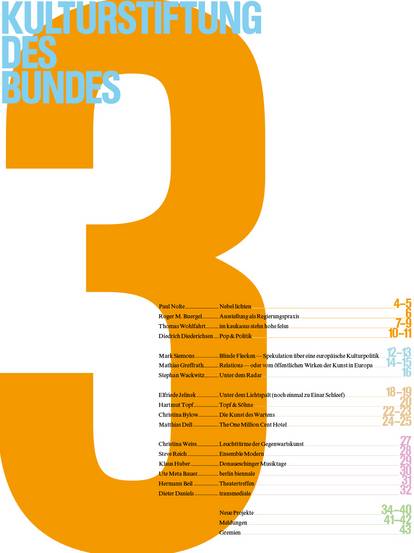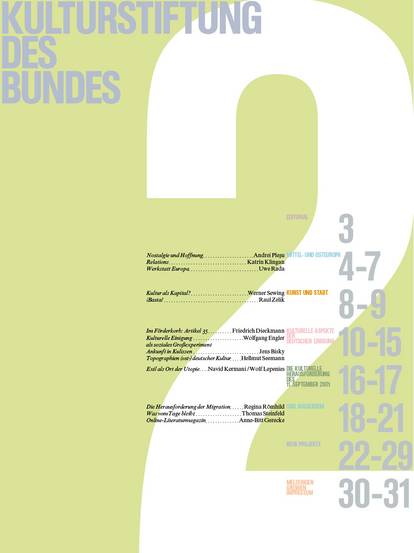From personal experience, the chairwoman of the German Ethics Council Alena Buyx (AB) is quite familiar with the obstacles that stand between learning from crisis situations and changing one’s social behaviour accordingly. In the following interview with the political economist Robert Lepenies (RL) she discusses the chances of institutional changes in crisis mode, the responsibility of learning and the significance of civic participation for state governance in the coming years.
RL Ms. Buyx, a few days ago, the editors of this magazine held an interview with the New York legal and cultural scholar Jedediah Purdy. One of the main topics of their conversation was the role that fear plays in societal crisis situations. What role does fear play when you predict future scenarios, from which you then issue recommendations to the German federal government?
AB We have this wonderful and fitting saying: Fear is a bad counsellor. When someone like me assumes a role as a political advisor and addresses the public, they have to first sense the fear in order to come across as genuine and be able to understand the situation. For me and for many others, this crisis has been an unprecedented situation – something completely out of the ordinary. One’s fear has the function to underscore this state of emergency. You have to be able to feel it, otherwise you lose empathy and the awareness that there are groups out there that are even more frightened and vulnerable than you – and for good reason.
RL What kind of social groups and specific fears do you have a special connection to?
AB I was isolated – in a positive sense – from many frightening situations. Our living space wasn’t tiny. I wasn’t afraid – although – I do admit that very briefly I feared that our entire system might blow up. I also played with such doomsday thinking, and I think that was a completely normal reaction to the first images of this pandemic. My personal, very real moment of fear came when I watched those images from Bergamo at the beginning of the pandemic. It was around that time that an important phone conference took place with over 900 participants from the medical ethics field to discuss drafting a triage protocol. That was March 2020. And I remember at the beginning of April, we had the protocol more or less finished, then came the moment when the head of intensive medicine at the Munich Uniklinik told us, “We’ve got only one level to go in our action protocol. And when we reach that, it’s over. Then we can no longer treat everyone.” Munich was extremely affected. That’s the moment I’ll probably never forget, for that’s when I and an ad-hoc team of clinical ethicists would have had to advise the medical staff on such difficult cases of triage. That it could really come to that, that the German health system, a university medical centre could reach its absolutely limits of treatment – that was very eye-opening. And I think most of us have had comparable moments during the crisis.
RL How can you continue to function in such moments of crisis? What helps you?
AB When you have such responsibility, you can’t let fear overpower you. Don’t foolishly dismiss the severity of the situation, but also try to avoid making hasty decisions – that’s the key. I am very aware of this necessary balance, and I used to remind myself again and again very early: We are all in an emotional state, and none of us talk about it! We’re all carrying on as if everything were completely normal. We switch over to Zoom, including the members of the Ethics Council, and – boom – we simply move on without missing a beat. In the future, it would surely help us to acknowledge states of emergency for what they are and to experience them consciously.
In the past months, I found myself in several working contexts where I was the only ethicist in groups of extremely high-ranking political advisors. The exchange between medical ethicists in Europe helped me overcome this feeling of unprecedented insecurity.
RL Do you believe that a large segment of the population hasn’t realised how close we were to deciding on triage in some places? Did you get the feeling we should have communicated what the situation was really like more clearly?
AB In my opinion, this was expressed very clearly. But a couple of social scientific studies have shown that one’s personal connection strongly influenced one’s view of the crisis, for example, having direct contact with a sickened person. Obviously, this would make you less susceptible to the narratives pushed by the coronavirus deniers.
My feeling is that all in all, there was indeed a lot of fear. And the more that authorities emphasised the seriousness of the situation, the stronger was the defensive response of people who couldn’t bear it and sought a counter narrative as a result. One must find the delicate balance between honestly acknowledging emotions and an emotionalising the situation. This balance provides protection against those who invalidate principles of rationality in social debates.
RL When you look back at the last few months, what coming crises do you see following at the heels of our present one? Have our “crisis knowledge”, the ability to take action and our resilience in dealing with crises improved? What should we be doing so that we’re better prepared in the future – also from the perspective of the Ethics Council?
AB We have to study the past, we have to learn, we have to heal. Studying the past means looking at what went well – and there are plenty of things that went well. And then we’ll have to look at where mistakes and problems occurred with respect to state-mandated coronavirus-related policies. We need critical discourse on the latter – no question about it. All too often people focus on what happened in civil society. It’s amazing – to this day we constantly encounter people who achieve top performance. Here’s another example: in Munich we had a certain advanced warning with the very first outbreak in Germany at the Webasto headquarters in January. In just under three days, we made a hospital, a gigantic university medical clinic with numerous institutes, completely pandemic-ready. It was impressive to see how fast the patient traffic was redirected, how – in no time flat – protective gear was gathered, and hygiene concepts were put together. Sometimes emails were flying back and forth at four in the morning. I think it’s a shame that such rapid responses and achievements don’t play a greater role in our story of the crisis.
RL What areas need to be examined where things didn’t go well?
AB We have to study how the institutions cooperated with one another, how the relationship between science and politics functioned. We’ve determined that administration and bureaucracy have huge problems with implementation, that the decision-making processes simply do not work. We have an outstanding scientific sector, we have very good ideas, but putting these into practice sometimes turned out to be astoundingly difficult. The complex relationship between digitalisation and data protection and our cultural modes of dealing with data absolutely have to change. And of course, the slow-paced digitalisation of our schools. We clearly noticed where our social weak points lie. And this is what we have to work on by consistently learning from the crisis. What can we do better? What kind of institutions do we need?
For me as an ethicist, this is the ethical desideratum of the crisis. We need “pandemic preparedness”. I’ve been saying this, all of my colleagues have been saying this for ages. We all basically knew this before Covid. It reminds me of that wonderful line by Ross Upshur, a Canadian colleague, regarding the Ebola campaign in West Africa: “The most powerful lesson learned […] was that we do not learn our lessons”, and that is true indeed. But if we do not learn our lessons voluntarily, then learning them must be mandatory. Learning has to be institutionalised.
RL And how could that work?
AB By incorporating learning cascades. We must ensure that we don’t forget the lessons we’ve learned within one legislative period. We now have a window of opportunity to create new structures to protect ourselves. We must take advantage of it. For example, I find the institution of the Federal Health Agency, which was discontinued in the past and is now being discussed again, an absolute “no-brainer”. It’s obvious in hindsight that we would have needed it, as well as a better equipped public health sector. This leads us to the fundamental question of how institutions, which were conceived for peace times and designed to operate quietly on a day-to-day basis, can shift to crisis mode if need be.
RL So you’re saying we need to extensively restructure our institutions in case of emergency?
AB We have to clarify whether we need additional structures, a kind of overarching reserve, a task force of sorts whose members from various areas can convene at a moment’s notice. Here we hit the limits of short-term readiness and the cyclical nature of political decision-making. That’s why we have to strengthen institutions independently of legislative periods which do not have an obvious political mission. The World Health Organisation (WHO) is a good example. We also need new, international, overarching organisations that are equally financed and are authorised to carry out certain interventions. This will never function very well, but I hope it will function better. It’s like the squaring of a circle – an enormous challenge. But on the whole, I’m optimistic.
RL You spoke about the role of public institutions – what is your message to private individuals and companies?
AB Naturally they too must be involved in the conception of these new institutions. We have some of the world’s best logistics experts in Germany, absolute world-class companies. They weren’t able to contribute their expertise to the vaccine campaign, and I cannot understand it. Obviously, you can’t simply grant a corporation the authority to supervise such government processes. What we can do, though, is have structures in place that allow us to draw on the expertise from the private sector when managing such extremely important tasks.
RL How do we bridge the social rifts? You mentioned the need to heal...
AB That’s difficult because solidarity in the long term – especially if it’s not entirely voluntary – is stabilised by indirect reciprocity. And these expectations of reciprocity in society which are expressed through acknowledgement and financial compensation have been sorely disappointed. Now the young generation is angry. Understandably so. But we have to work on improving this social cohesion again to counter the divisions which have formed during the crisis.
RL Are these divisions perhaps also the result of a fraught relationship between the state and its citizens?
AB In that respect, we need more dialogue and possibilities for direct civic participation. This strange impression that there’s only the state up there, and we’re down here, the “sheeple”, does not adequately reflect our other political relationships. But there was a short period of very direct rule by decree. This disturbed many people – and understandably so. But now we have to re-establish a stronger understanding of our own self-effectiveness. And also recognise that many absolutely constructive grassroots projects were not truly integrated.
RL Assuming you had all the resources you needed for your work, and assuming you could turn back time – what would you have done differently in the Ethics Council? Would you have chosen other methods, or addressed other issues?
AB There are two failings that I personally regret. Both were due to real limitations. The first is that we didn’t focus specifically on the ethical challenges facing the young generation in the beginning. But this regret concerns the early stage of the pandemic. The problems only accumulated over time. And now we’re getting the major studies on psychological illnesses, gaps in learning progress, social impacts and domestic violence. As the pandemic continued, we tried to initiate a public debate on the concerns of the young generation.
And the second was a failing of participation. It was something I constantly mentioned, but nonetheless, so much was neglected in my opinion. Imagine how much we could have tried and implemented. Relatively early on, there was the hackathon #WirVsVirus – it was super, a great event. Some 70,000 people participated. I was really impressed. But implementing what was developed – this process doesn’t function so well in our existing political structures. And that’s what we have to address: How can we institutionalise the process so that ideas don’t end up getting buried in the sand? Another field of participation concerns the sociological research situation, which was really good from the start. Such research has to be metabolised faster for political decision-making.
I’m sure that over time we will become aware of even more failings. There have been so many ethical questions in this crisis, and we addressed many of them. But unfortunately, you can’t do everything.
RL Are you happy to be part of the Ethics Council in Germany and not, for example, in a more polarised context like Great Britain?
AB Just imagine you were an ethicist in Trump’s America. I’m sure my colleagues there didn’t have a very pleasant time. And my colleagues in England, with whom I have been in regular contact, have also been pretty frustrated. But the problems we have in Germany are different. We don’t recognise our achievements as well and we lack a certain pragmatism, as we do infrastructures for crises. Then again, we generally have – if I may say so – a responsible body politic. And the majority of the population here believes in the value of science and standards of rationality. I was quite thankful to be in Germany.
At the same time there were moments when I was truly shaken, for example, with our recommendation on vaccination prioritisation. Seldom have I drafted a paper in which there was not only a broad argumentative basis from an ethical perspective, but also that it correlated to what was epidemiologically warranted. Moreover, there was an incredibly broad-based public support for it. And then the proposal enters the implementation phase and vaccination invitations are being sent out to people based on presumptions of their age based on their first names... There were moments when I thought: I cannot believe it.
RL It never ceases to amaze me how often we in Germany – in a global pandemic – avoid a debate about the suffering of others beyond our national borders. For example, regarding the inadequate response to vaccination production and distribution. Don’t we have to take those “distant others” into account in our moral considerations? Where is German cosmopolitanism?
AB I have an answer for those cosmopolitans. Real-world ethics inform my thoughts on this. We are the German Ethics Council. Naturally, in our debate on prioritising vaccinations, we also immediately considered the global perspective of the crisis. I would therefore argue for two things – and it’s difficult to bear: We have to end this pandemic globally, otherwise it will not end here at home. The argument for global solidarity, the knowledge of suffering in other countries should be reason enough. But if that doesn’t suffice as motivation, then at least self-interest should – namely that mutations that develop elsewhere will eventually make their way to us. This is a very instrumental form of solidarity driven by self-interest.
At the same time, nation states and especially governments have the responsibility to protect their own population. In this country, it’s written in the constitution. That’s totally fine, but naturally this elicits a contradiction to a moral conviction held by many: “We are all equally important as human beings.” In the state system, one’s own population clearly takes precedence over distant others. That doesn’t mean – now we come full circle – that we humans don’t have to look out for each other beyond our borders. Once you have taken care of your own, then you should take care of the others.
RL You started thinking very early on about other challenges and potential global health crises, for example, in your writings about multidrug resistant germs or the effects of climate change on our health. Now we’ve discovered – you’ve said it yourself – that we haven’t learned very much. As someone who is particularly far-sighted thanks to their expertise, what do you think is important to address? How should we be moving forward?
AB I’m not the kind of person who says: Crises are coming that pale in comparison to what we’re facing now. That would be catastrophising. The resistance to antibiotics is a major problem, but I don’t expect any situation in the next two years that would eclipse this one in any way. But yes, something like this is sure to happen again, that wasn’t the last pandemic. And we also have the climate crisis. The point is that there are so many ideas for dealing with it. In the modern fight against pandemics, there are thirty or forty years of literature explicitly outlining procedures with recommendations for action. I hope that in politics and beyond, we will make use of this boost in innovation. The pressure needs to be there.


![[Translate to English:] Magazine 37](/fileadmin/_processed_/b/c/csm_Mag37_Cover-Vorschau_921x1230_b5129fdb2a.jpg)


